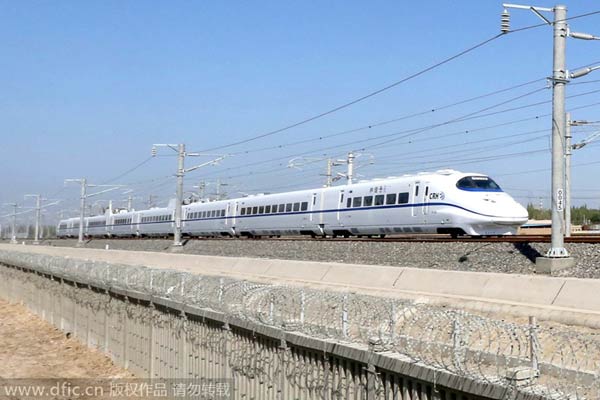 |
|
A CRH bullet train travels on the Lanxin (Lanzhou-Xinjiang) High-speed Railway in Hami, Northwest China's Xinjiang Uygur autonomous region, Sept 16,?2014.[Photo/IC] |
BEIJING - China's high-speed rail?program is expanding to the country's west, bringing changes to the local development.
"Fast access to ancient Silk Road"
The Lanxin high-speed railway linking Xinjiang's Urumqi with Lanzhou, capital city of the northwestern province of Gansu, will be put into service by the end of this year, providing a fast and modern channel along the traditional Silk Road.
The 1,776-km high-speed rail line passes through China's northwestern regions of Gansu, Qinghai and Xinjiang. It is China's first high-speed railway built in a high-altitude region.
According to data from Xinjiang's development and reform commission, new rail will increase annual freight volume of the Lanxin railway to 150 million tons compared with 78.5 million tons in 2013.
For years, the Lanxin railway was the only link between Xinjiang and other parts of China.
Li Hanlin, director of the socio-economic development institution of Gansu Communist Party School, said the Lanxin high-speed railway will further upgrade northwestern China's railway network, enhance transportation capacities and promote the development of the Silk Road Economic Belt.
More oil, coal and new energy bases are expected to be built along the new rail line, said Sun Faping, a researcher of the Academy of Social Sciences of Qinghai Province. This will make the energy sources of the country's vast western region better allocated and prices for industrial raw materials are expected to fall.
Tourism will also benefit from the new high-speed rail. Scenic spots in the nation's far west are abundant, but scattered. Travellers used to spend most of their time on the road, moving between sites. The operation of the new railway will change the current situation, said Zhu Ming, director of the tourist bureau of Jiayuguan, "Touring along the Silk Road will become more convenient."
Linked with the world
With construction of the high-speed railway expanding to the west, more secluded areas are becoming connected with the world.
The 857-km Guiyang-Guangzhou railway express line to be put into service soon links the underdeveloped Guizhou capital with Guangzhou, capital of South China's Guangdong province, one of the country's economic powerhouses. The high-speed rail line will shorten the travel time between the two cities from 20 hours to four.
The Guiyang-Guangzhou express line will also help enterprises in the southwestern part of the country expand business to the Pearl River Delta. "We will build a local herb medicine exhibition base in Longli after the operation of the high-speed rail, to attract buyers from the Pearl River Delta," said Li Qiang, manager of a Chinese herbal medicines technology company in Guizhou.
Longli county of Guizhou province is inhabited by more than 20 ethnic minorities, and used to be little known to the world. The county will be only 10 minutes away from the provincial capital after the operation of the Guiyang-Guangzhou high-speed rail and has already drawn 70 enterprises into its new high-tech park over two years. Its GDP this year is expected to reach 5 billion yuan ($814 million).
One-hour economic circle
The nation's expanding high-speed railway projects also reduce the travel time between cities.
Express trains have shortened the time from Xinjiang's Urumqi to Turpan to about 40 minutes. Travel time from Inner Mongolia's Hohhot to Baotou will also be slashed by an hour to about 40 minutes.
Yu Guangjun, director of the Institute of Economics of the Inner Mongolia Academy of Social Sciences believed population distribution is an important factor prohibiting regional economic development.
He said after the increase of high-speed railways, intercity transportation will be greatly improved and will be beneficial for the cities' integrative development.
"I expect, one day, I could have morning tea in the metropolitan Guangzhou, lunch in the neighboring region's scenic Guilin city and dinner back in Guiyang," said Chen Ruyi, a 71-year-old citizen in Guiding county of Guizhou province.
